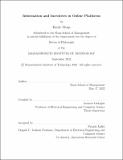Information and Incentives in Online Platforms
Author(s)
Meigs, Emily
DownloadThesis PDF (1.183Mb)
Advisor
Ozdaglar, Asuman
Terms of use
Metadata
Show full item recordAbstract
This thesis studies the impact of information and design of services for online platforms in three settings: traffic routing, network games, and competition between streaming platforms. In the first part of this thesis, Chapters 2 and 3, we study game play in routing and network games, where it is reasonable to assume agents do not originally know their payoff functions. Specifically, in Chapter 2 we examine the outcome of the learning dynamics in traffic routing where the latency functions are unknown. We show that the combination of selfish routing and learning dynamics converges to the full-information Wardrop equilibrium, this supports the study of the Wardrop equilibrium even in settings where information must be learned over time. In Chapter 3 we use analogous learning dynamics in a different setting, network games where the agents’ personal utility functions are not known. This may arise in games of local public goods provision or firm competition. We show that the combination of best response and learning dynamics converges to the Nash equilibrium.
In the second part of the thesis, Chapter 4, we study the problem of sharing information in traffic routing. We investigate whether a routing platform, for example Google Maps or Waze, should share full information, no information, or partial information. We characterize the optimal information strategy in a two-stage setting, where the platform is also learning of the road conditions from the users. We then extend the intuition to an infinite stage setting and find an information scheme that achieves a lower cost than full information.
In the final chapter of the thesis, we study bundling and pricing strategies in streaming platforms, for example Netflix or Hulu. We investigate why there are so many streaming platforms that are succeeding in the market. We first study the setting where a market leader creates a new product and has a monopoly on the market. We show in this case it is optimal in some cases for the platform to bundle their goods. Once another firm enters the market though we show that unbundling becomes the unique optimal strategy.
Date issued
2022-09Department
Massachusetts Institute of Technology. Operations Research Center; Sloan School of ManagementPublisher
Massachusetts Institute of Technology